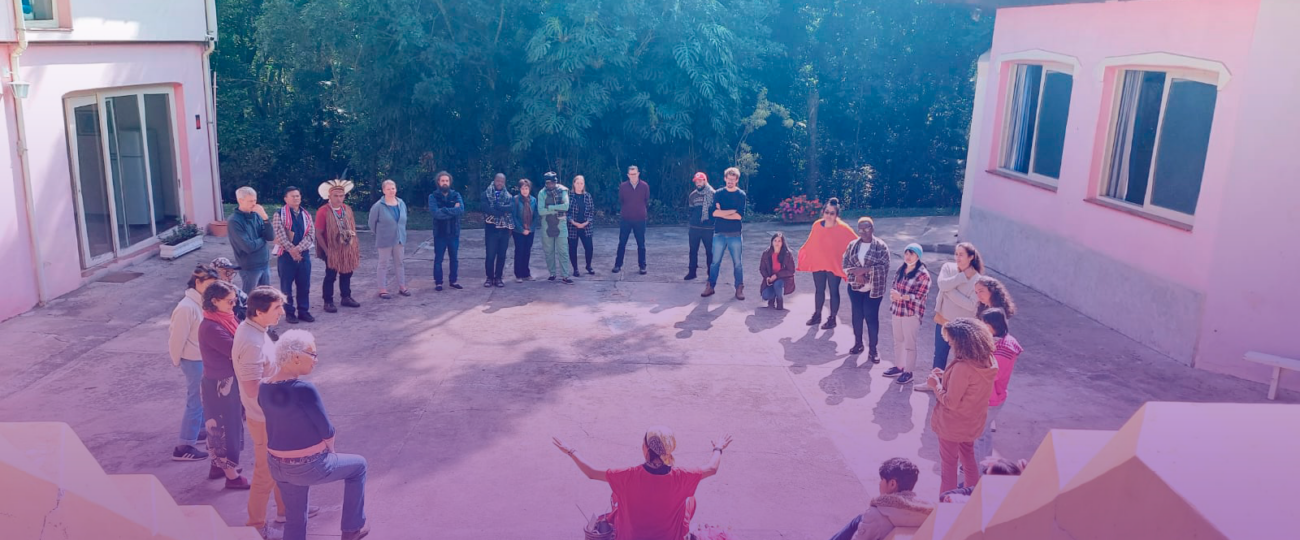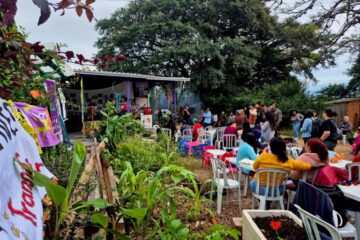Feminism makes contributions to the struggles for the forests and their communities by centering on the role women play in the sustainability of human and nonhuman life. Feminism fights capitalist colonization, the Western sexual and racial division of labor, and the destructive and encroaching modes of production; it formulates an anti-systemic critique and joins forces with communities that are attacked around the world. Denouncing how communities that do not conform with hegemonic standards are broken apart is part of feminist, anti-capitalist, anti-racist vision, as well as strengthening their knowledge, resistance, and ways of living. When transnational companies occupy territories, they reinforce patriarchy, reshape social relationships, and turn communities from different parts of the world into victims of exploitation.
Capitalism relies on the control over nature, and women’s labor and bodies. And as big companies force themselves into communities, establishing mega projects and operational models, capitalist control and exploitation also move forward. Members of the World Rainforest Movement and the World March of Women have organized an exchange program of wisdom-knowledge and experiences in May 14-17 in Parelheiros, São Paulo, Brazil, to reflect on the different and similar challenges women and entire communities face around the world when their territories are occupied by these companies.
Exhange Programs, a Methodology Adopted by Movements
Exchange programs are ways to share wisdom-knowledge between militants from different territories. “It is a political and pedagogical tool, because when we visit new territories of struggle and step into them, we are more able to acknowledge the different voices of resistance that are there: older people, women, young people, who are political actors that are not able to speak so often at big events. In their territories, we can see better how life can be organized,” Natália Lobo, of the World March of Women, says. In territories where there is conflict, exchange experiences are also moments to show support and solidarity, strengthening local resistance and allowing us to see the systemic similarities between apparently local conflicts.
The meeting in May was attended by people with grassroots movements from Africa, Asia, and Latin America who struggle for environmental justice, agroecology, and food sovereignty. These are militants of environmental and peasant movements who struggle for territory and against green economy.
The exchange program was an opportunity to discuss and share challenges, including the advancing agricultural frontier and the green economy, with their mega mining projects, increasing monoculture farming practices—like eucalyptus and oil palm—, land grabbing, and policies aiming at the financialization of nature. It was also an opportunity to have and share experiences, ideas, and wisdom-knowledge that bring together communities and their struggles. Claudia Guillén, from Chiapas, Mexico, said “life in the territories is also joyful, it is not just about mega projects.” She argues that the exchange experience is also a way to show resistance and “strength where women play the lead role.”
Aminata Finda Massaquoi, a militant from Sierra Leone, says the experience of working with women from another part of the world has helped her realize how women from her country and women from Brazil share common challenges. “In this part of the world, there are other women that are facing these challenges, but they are still making efforts to go against the odds. This is a continuous fight and struggle. It’s good to know that we are not alone, because most of the time we are just fed up, but wherever you go, you meet the same struggles,” she says.
Aminata also underscored the community aspects of the agroecological work carried out by women from Vale do Ribeira, an area in the state of São Paulo the group visited. They were able to listen to women share how they carry out their work collectively and the positive impacts on the community. “Restoring this wisdom-knowledge also means restoring the stories of my ancestors,” Aminata argues.
Feminism and Youth Defending the Forests
Many conversations drew from the reflection on the role of feminism in the struggle, including the role of youth in the communities. The young Indonesian woman Wiwiniarmy Andilolo says that, in her country, Indigenous people and peasants are usually stigmatized by youth influenced by the urban hegemonic rhetoric. “They prefer to live more ‘comfortable’ lives in big cities, because they don’t have this sense of belonging. The younger generations tend to feel like they are different, they are separated from the community,” she says.
Facing this trap that tears communities apart in connection with the advancement of capitalism, traditional communities work hard to keep their wisdom-knowledge alive by connecting with their territories and nature, with shared ways of living, building bridges between urban and rural areas, between modern and ancestral. “I’ll go back to my hometown after finishing my studies in the city, and I’ll do something like what the community has done here. You don’t have to be on the border of our own community to be upended up to new perspectives, and that is exactly what we are doing now,” Winwin says.
Women’s political participation directly impacts life in the community. When women organize, their communities tend to become more aware of the risks big companies can bring to their territories. As women are in charge of fundamental tasks to sustain life and bring communities together, they provide different perspectives on the advancement of capitalism and the market, and they are more committed to protecting their territories. Natália Lobo shared one example, about an experience in the Brazilian Northeast, where women are actively fighting wind energy companies. “In these communities, the militants of the WMW are organized in associations, in the mixed-gender spaces, and what they told us is that they are the first people in the associations, in the places of organization, that said no to wind energy.”
In Chiapas, Mexico, as well as in several regions in Africa, women are on the front lines struggling against oil palm plantations. The companies that produce palm oil in countries in the global South use military forces, labor exploitation, and land grabbing to get more profits from raw material extraction. This leads to several impacts on community life, including a surge in violence against women and girls, and precarious labor, with no rights. Aware of the risks posed to the reproduction of life as these companies advance, women have been organizing and strengthening bonds between feminist and environmental justice agendas.
Claudia says the struggle waged by sisters from Chiapas against oil palm plantations is similar to the struggle waged by Brazilian women for energy sovereignty. They are tough struggles, but women are fearless in organizing resistance: “Like our sisters from Chiapas, our sisters here also face such difficult and violent processes, they could certainly become bitter. But we have been welcomed with so much kindness and tenderness, they shared warm embraces, food, and joy in their territories, and that is beautiful and very inspiring.”
During the exchang program, Natália mentioned a song by the Brazilian agroecology movement that goes, “without women, the struggle is just half strong.” And around the world, where capitalism advances, women also resist, exposing the destruction perpetrated by transnational corporations, a common enemy in many territories.




